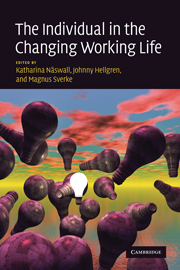Book contents
- Frontmatter
- Contents
- List of figures
- List of tables
- List of cases
- List of contributors
- Acknowledgements
- 1 The individual in the changing working life: introduction
- Part I Threats and challenges
- 2 New rules of work: exploring the boundaryless job
- 3 Changing work roles: new demands and challenges
- 4 The Demand-Induced Strain Compensation model: renewed theoretical considerations and empirical evidence
- 5 Job insecurity and employability among temporary workers: a theoretical approach based on the psychological contract
- 6 Independent contracting: finding a balance between flexibility and individual well-being
- 7 Work–family conflict in individuals' lives: prevalence, antecedents, and outcomes
- 8 My love, my life, my everything: work–home interaction among self-employed
- 9 Modern work and safety
- 10 Romantic relationships at work: old issues, new challenges
- 11 Ethnic diversity at work: an overview of theories and research
- Part II Individual attempts at restoring the balance
- Part III Intervention and promotion on the organizational level
- Index
- References
3 - Changing work roles: new demands and challenges
Published online by Cambridge University Press: 13 October 2009
- Frontmatter
- Contents
- List of figures
- List of tables
- List of cases
- List of contributors
- Acknowledgements
- 1 The individual in the changing working life: introduction
- Part I Threats and challenges
- 2 New rules of work: exploring the boundaryless job
- 3 Changing work roles: new demands and challenges
- 4 The Demand-Induced Strain Compensation model: renewed theoretical considerations and empirical evidence
- 5 Job insecurity and employability among temporary workers: a theoretical approach based on the psychological contract
- 6 Independent contracting: finding a balance between flexibility and individual well-being
- 7 Work–family conflict in individuals' lives: prevalence, antecedents, and outcomes
- 8 My love, my life, my everything: work–home interaction among self-employed
- 9 Modern work and safety
- 10 Romantic relationships at work: old issues, new challenges
- 11 Ethnic diversity at work: an overview of theories and research
- Part II Individual attempts at restoring the balance
- Part III Intervention and promotion on the organizational level
- Index
- References
Summary
Working life has gone through numerous changes in recent decades, as has been observed and commented on by a number of researchers and practitioners (e.g. Burke and Cooper, 2000; Gowing, Kraft, and Quick, 1997; Gallie, White, Cheng, and Tomlinson, 1998; Howard, 1995; Pfeffer, 1997). Some of the changes often described in the literature relate to the increased occurrence of reorganizations, happening not only through changes in ownership but also in connection with downsizing (Burke and Nelson, 1998; Pfeffer, 1997), which have been found to bring about both a diminished degree of predictability and an increased experiencing of job insecurity for individuals (Ferrie, Shipley, Marmot, Stanfeld, and Smith, 1998; Sverke, Hellgren, and Näswall, 2002). However, it is not only organizational and structural changes that define the new working life, as it has been argued that the work itself, as well as its conditions, has also changed (Howard, 1995; Burchell, Ladipo, and Wilkinson, 2002).
One of the more prominent changes has been the gradual transition from a product industry to a service industry (Tetrick and Quick, 2003). The demands placed on the individual have accordingly become more mental than physical in nature, as the object of work has had less to do with the manufacturing of finished products. What characterizes service-oriented work, rather, is the process of communication, in which the concern is to identify the needs and wishes of the customer.
Information
- Type
- Chapter
- Information
- The Individual in the Changing Working Life , pp. 46 - 66Publisher: Cambridge University PressPrint publication year: 2008
References
Accessibility standard: Unknown
Why this information is here
This section outlines the accessibility features of this content - including support for screen readers, full keyboard navigation and high-contrast display options. This may not be relevant for you.Accessibility Information
- 16
- Cited by
